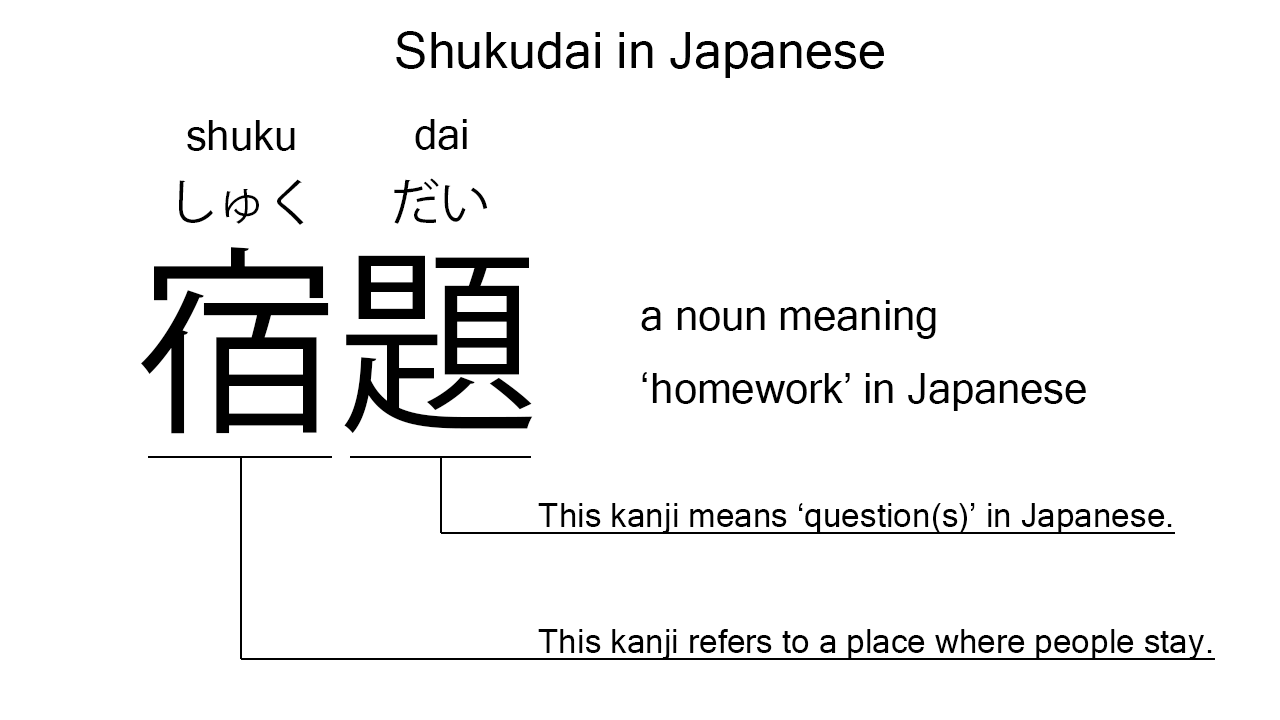What does “shukudai” mean in Japanese?
Native speakers use shukudai to mean ‘homework’ in Japanese. Perhaps, some Japanese learners know this word as it is sometimes used in Japanese textbooks. In this blog post, however, I will explain this word in detail based on its kanji expression. And also, I will explain how to use it through example sentences. My explanations would help Japanese learners understand shukudai more clearly. Then, let’s get started!
Contents
Definition and meaning of “shukudai”
Let me start with the definition and meaning of shukudai.
- shukudai – 宿題 (しゅくだい) : a noun meaning ‘homework’ in Japanese.
Native speakers use this noun to refer to a task or tasks to do at home after school. So, the usage is very similar to that of the English noun, homework, I think.
The definition and meaning are simple and clear. To understand this noun more clearly, however, let me explain its kanji characters in detail, one by one.
Shukudai in kanji
The kanji expression of shukudai consists of the following two kanji characters:
- 宿 : a kanji character used to refer to a place where people stay.
- 題 : a kanji character used to mean a ‘theme’, ‘subject’, ‘question’, or ‘problem’ in Japanese.
From these two kanji characters, we can understand that shukudai literally means ‘a place where people stay and questions’ in Japanese. This literal interpretation is not completely in line with the actual meaning, but still understandable, I think. Homework is often a set of questions which people need to solve at home.

When we meet new kanji expressions, we should check their kanji characters in detail to understand their meanings clearly and deeply. In many cases, kanji characters tell us a lot about the meanings of the expressions they form. Actually, here, we could get the better understanding of shukudai through the detailed kanji check above.
So far, I’ve explained the definition and meaning of shukudai together with its kanji characters. Then, let me explain how to use it through the example sentences below.
How to say “homework” in Japanese
kyou wa shukudai ga takusan aru – 今日は宿題がたくさんある (きょうはしゅくだいがたくさんある)
Today, I have a lot of homework.
Below are the new words used in the example sentence.
- kyou – 今日 (きょう) : a noun meaning ‘today’ in Japanese.
- wa – は : a binding particle working as a case marker or topic marker. In the example, this works as a topic marker after kyou to put a focus on it.
- ga – が : a case particle used to make the subject word or the object word in a sentence. In the example, this is used after shukudai to make the subject in the sentence.
- takusan – たくさん : an adverb of quantity meaning ‘many’, ‘much’, or such in Japanese. In the example, this works to emphasize the amount of the homework.
- aru – ある : a verb meaning ‘to be’, ‘to exist’, ‘to present’, or such in Japanese.
This is a typical usage of shukudai. In this example, it works as a part of the commonly-used phrase, shukudai ga aru, which literally means ‘homework exists’ in Japanese. This phrase is often translated into English as ‘to have homework’, though.
Another example of “shukudai”
boku wa shukudai wo katazuke mashi ta – 僕は宿題を片付けました (ぼくはしゅくだいをかたづけました)
I finished my homework.
Below are the new words used in the example sentence.
- boku – 僕 (ぼく) : a pronoun meaning ‘I’ in Japanese. This is used mainly by boys and young males.
- wo – を : a case particle used to make the object word in a sentence. In the example, this is used after shukudai to make the object in the sentence.
- katazuke – 片付け (かたづけ) : one conjugation of the verb, katazukeru, which means ‘to clean’, ‘to clear’, ‘to finish’, or such in Japanese. In the example, it has been conjugated for the better connection with its following word.
- mashi – まし : one conjugation of the auxiliary verb, masu, which is used after a verb to make it polite. In the example, this is used after katazuke to make it sound polite.
- ta – た : an auxiliary verb used after a verb, adjective, or auxiliary verb to make its past tense form. Probably, this is well known as a part of Japanese ta form. In the example, this is used at the end of the verb phrase to mean ‘to have finished’ in Japanese.
This is another example of shukudai. In this example, it works together with the case particle, wo, to become the object in the sentence. When we want to mean ‘homework’ in Japanese, anyway, this noun is always a very good option.
Summary
In this blog post, I’ve explained the definition and meaning of shukudai in detail based on its kanji expression. And also, I’ve explained how to use it through the example sentences. Let me summarize them as follows.
- shukudai – 宿題 (しゅくだい) : a noun meaning ‘homework’ in Japanese. Native speakers use this noun to refer to a task or tasks to do at home after school. So, the usage of this noun is very similar to that of the English one, homework. These two kanji characters literally mean ‘a place where people stay and questions’ in Japanese. This literal interpretation is not completely in line with the actual meaning, but still understandable, I think. Homework is often a set of questions which people need to solve at home.
Hope my explanations are understandable and helpful for Japanese learners.
Leave a Reply